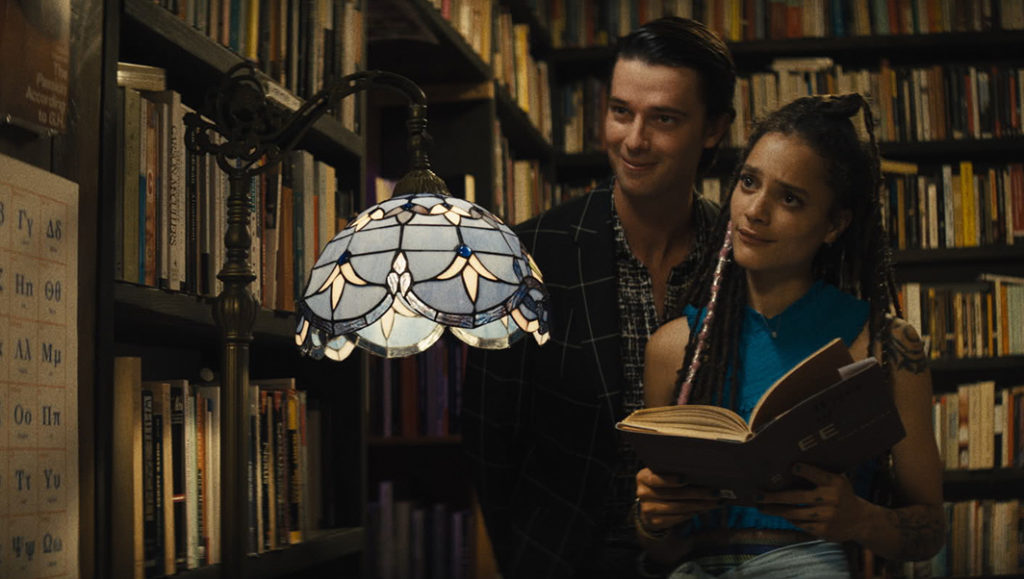Exclusive Interview: Pop Culturalist Chats with Daniel Isn’t Real’s Sasha Lane

Sasha Lane is one of Hollywood’s most exciting leading ladies. Since bursting onto the scene in her 2016 debut, American Honey, Sasha has quickly become a tour de force, earning praise from Variety, Entertainment Weekly, the Los Angeles Times, Vulture, and many more. She’s proven she has the ability to tackle both challenging characters and challenging concepts.
This December, she stars opposite Miles Robbins and Patrick Schwarzenegger in the psychological thriller Daniel Isn’t Real. It tells the story of a troubled college freshman who suffers a violent family trauma and resurrects his childhood imaginary friend to help him cope. Pop Culturalist caught up with Sasha to chat about Daniel Isn’t Real, her preparation for the film, and why this story hits close to home.
PC: Tell us about Daniel Isn’t Real and your character in the film.
Sasha: For me, Daniel Isn’t Real is a dive into the psyche of a young man whose mom is dealing with schizophrenia and other mental health issues. He starts to see a lot of those symptoms developing in himself.
As a result, he develops this imaginary friend to help him cope. There’s this back and forth trying to figure out if it’s just pretend or if this is turning into something outside of him. The film focuses on a male going through mental illness, which we don’t see depicted a lot in media. I thought that was pretty special.
My character, Cassie, is in ways the more emotionally evolved one. She’s an artist who’s really in touch with herself. She becomes this support for him. She understands him and helps him get out of his mind.
PC: The film is based on a novel called In This Way I Was Saved. How familiar were you with the source material? How did you prepare?
Sasha: I actually wasn’t familiar with the book. It’s funny—a family friend of mine was updating me on the book while I was filming. If I’m filming a movie based on a book, she likes to read it before I start filming. [laughs] She told me about it. But I prepared to step into Cassie’s shoes by chatting with Adam [Egypt Mortimer], our director. We talked personally about my own struggles with mental illness. I tapped into my own experience and looked outside in.
I’m usually the one with voices in my head. It’s something that I deal with in my everyday life. But in this project, Cassie is watching someone who’s struggling with a voice in their ear. We would do these exercises where we’d keep Miles focused while Patrick was yelling in his ear. My character is the one who’s talking Miles’ character through this. To get into this character, I had to think about what it would be like if someone was looking at you.
PC: The film has made its way through the festival circuit, and it’s been well received by critics and audiences. Why do you think the story is resonating with audiences? What attracted you to this project?
Sasha: For me, it was a personal thing. I really admired how Adam presented it to me as far as here is this boy who’s dealing with a mother who has something traumatic, which is difficult for anyone to go through, let alone a kid. You’re telling this story about his journey and how he handles it.
It’s told beautifully through this horror story where no one knows what is going on. But at the root of the story is a struggle that many people deal with. This genre allows people to interpret it how they want. You can see it as a horror film or something grounded in reality.
PC: The film covers a lot of heavy topics like toxic masculinity and mental health. Does that change the weight to a project like this?
Sasha: Definitely! When you get a project like this, you want to do it justice. It’s covering a topic that many people deal with, myself included. It’s a challenge because this is entertainment, but it’s dealing with something that people struggle with. You don’t want to mess that up.
PC: Cassie and Luke have this complicated journey throughout the film. How did you and Miles approach that dynamic?
Sasha: Adam got us together for rehearsals before we started filming. They were intense. We went over each scene. I’m not used to that, but I think it worked really well for this. It helped Miles and I build that relationship. It allowed us to get comfortable with each other. We would try different interpretations of each scene, which was super helpful because each scene matters.
I also told Miles about my own experience and the things on my mind and how I handled them. It helped us build that bond. It was an intense filming experience, and by the time we got on set, we were already in sync with each other.
PC: A lot of your scenes involved both Miles and Patrick. How challenging is it to have two scene partners, but one that you don’t engage with?
Sasha: It was actually easy for me because I’ve dealt with voices in my head that I ignore. For me, it was kind of humorous in a dark way. This is the inside on the outside.
PC: What do you hope audiences take away?
Sasha: I hope they see that it’s Miles’ character going through this. Often it’s the female character who’s struggling with mental illness. But males go through it as well, and they often don’t have the same support. They’re told to tough it up and be a man. I think it’d be special if people realized it’s something that everyone struggles with regardless of gender.
To keep up with Sasha, follow her on Twitter and Instagram. Catch Daniel Isn’t Real in select theaters and on VOD.


Discussion about this post